 Leading Blog | Posts by Month |
 Leading Blog | Posts by Month |
04.30.10

LeadershipNow 140: April 2010 Compilation
Posted by Michael McKinney at 08:00 AM
04.28.10

We Have Met the Aliens and They Are Us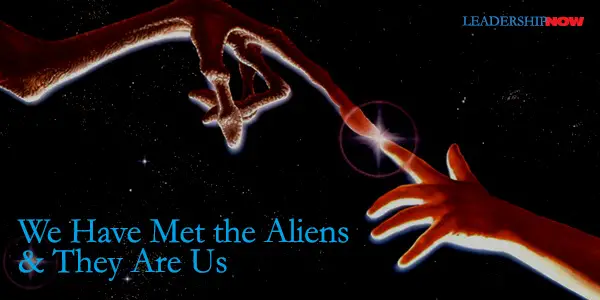
WE live in a time—aided by advances in science and communication—that is obsessed with quantifying, labeling and optimizing. Generational studies are no different. While identifying and labeling the generations is valuable for understanding and discussion, if we are not careful we can lose some connection to their humanity—their sameness. While generational studies can help us to understand where people are at, if want to engage them, we would do well to remember what they are. A generation comes and a generation goes. Each carries with them their own reaction to the former generation that raised them and their own disbelief of the reactions of the next generation to their own. Yet, each generation is not a new subset of humans; a curious new life form that needs to be studied and obsessed over. They are human. They are like us. "That which seems the height of absurdity in one generation often becomes the height of wisdom in another." We do a disservice to any generation when we coddle them and commoditize them. What generation doesn’t want everything just right? But life doesn’t work like that. Our ideals keep us pushing on, exploring, reflecting, and innovating, but our disappointments and the imperfections we uncover, help us to learn compassion and build character. Every generation has difficulties to overcome and excesses to curb. Every generation is faced with the prospect of growing up. And each generation does it from a different perspective. A perspective that they gained from their observation of those that came before them. And they will hand a different perspective, a different emphasis, over to those that come after them. "Parents often talk about the younger generation as if they didn't have anything to do with it." Like us, they are reacting to their upbringing and the world it created and bringing with them an attempt to find some greater idealism. Similarly, they need to learn balance, curb excesses, and rediscover forgotten behaviors and values. They need to learn compassion, the freedom that comes from admitting that you don’t know it all, and the value in what has come before them. No one generation excels completely in all things. All have different pieces of the life puzzle. All begin by placing a different weight on what is important and need to work to find the balance that makes their life more complete. We all share a humanity that spans generations. Human nature doesn’t change. Not everything the previous generation did was bad. Often it was good and necessary, but was executed poorly. We can be thankful that while previous generations were concerned with “work-life balance,” they decided they had better keep their focus on the tiller so that we would have the opportunity to run on the deck, criticize their methods, and endlessly debate whether or not the figurehead represents us well. "When I was a boy of fourteen, my father was so ignorant I could hardly stand to have the old man around. But when I got to be twenty-one, I was astonished at how much he had learned in seven years." A study of generational differences, more than anything, helps us to understand the consequences of our behaviors. What has worked and what hasn’t. Why an over-emphasis on this causes a problem there. If we can learn from it, we profit. However, our natural reactivity causes us to not learn as we should or build on the lessons of those that came before us. Human beings are not hard-wired with the lessons learned from the previous generation. So we all start at the beginning—learning and relearning—in the context of the world we find ourselves in. Each generation must come to the same place at the end of their lives as the one before it. All need to grow up. We need to become practiced at learning from each other; valuing each generation for where they have been, what they are learning, and the perspective they bring. In a more connected world, the consequences of our behavior are greater. We have more reach. What we do affects more people and for longer periods of time. This creates a critical need for wise leadership. Each generation will rewrite their world. Their thoughts and ideals aren’t new. Their emphasis is. “Treat Millennials with respect and dignity. Don’t over-manage them. Make them feel included.” Really? This isn’t generation-specific. We all desire those things. Generational analysis also reminds us that not everyone sees things the way we do. “By understanding other generations’ perspectives,” writes Tamara Erickson in What’s next, Gen X?, “we are better able to position our ideas and requests in ways that are likely to have positive results and avoid at least some of the frustrations of today’s workplace.” There are many good books in print that help to highlight the challenges that current generations face, their perspectives, and how we might learn from each other, and offer points of connection to help bridge the gaps. Here are several:
All generations face the same human issues but from different perspectives and with different tools. But they all look for connection, meaning, and contribution. They all want to add value and feel the satisfaction of a job well done.
Posted by Michael McKinney at 01:28 PM
04.27.10

Leading Views: Donald Powell on the Qualities of a Leader In Thriving In the New Economy by Lori Ann LaRocco, former Federal Deposit Insurance Corporation Chairman Donald Powell shares his view of what a leader should be:
In Thriving In the New Economy by Lori Ann LaRocco, former Federal Deposit Insurance Corporation Chairman Donald Powell shares his view of what a leader should be:
Leadership is vital; it provides hope and stability. We usually know it when we see it. Leaders don’t panic. Leaders have ice in their veins. Leaders are disciplined and have a plan—and they execute. If the facts change, they change their course. Leaders set the tone, and more importantly, they lead through example … they walk the talk! Leaders must be able to stand the heat. They sometimes have to look people in the eye and say, we thought about doing that and decided not to participate, because we think a product/action has abnormal risk and would not be long-term beneficial to our shareholders. That is hard to do, especially when there is much pressure to perform with peers, but leaders don’t follow the crowd; and sometimes these decisions can have consequences.
Posted by Michael McKinney at 11:29 AM
04.26.10

Leading Outside the Lines: Mobilizing the Informal OrganizationRight now, the informal elements of your organization are either working for you or against you. Yet for most leaders, say Jon Katzenbach and Zia Khan, authors of Leading Outside the Lines, the informal organization is poorly understood, poorly managed, and often disregarded because it is too hard to think about.The formal organization has its own way of attracting, selecting, developing, and rewarding people—but it rarely has the power to affect promotion or compensation. Therefore, those who rise to influential positions in the hierarchy are more likely to be more comfortable with and skilled at using the formal organization than the informal….Informal leaders rarely have the kind of explicit qualifications that can be easily documented or communicated, much less evaluated.The informal organization lies in the human side of the enterprise and as most things that reside there, it is hard. Unlike the formal side with its top-down, rational approach, the informal is fuzzy, constantly changing and hard to measure. So it is understandable that we would like to somehow ignore it or work around it. But, “if you want your entire organization to improvise frequently and energetically in response to fast-moving change, formal management techniques alone won’t get you there. You need help from the informal side as well. Mobilizing the informal organization helps support formal management mechanisms, increasing their chances of success and deepening their long-lasting impact on the organization.” For leaders, the challenge is to find the balance between the formal and the informal elements of the organization in their particular situation, to achieve concrete, measureable results. When trying to make a change, our default tactic is to explain “in excruciating detail why the new plan is important.” We think if they get the logic of it, they will get behind it. But they often don’t. People need an emotional connection. Simply formalizing a new set of rules, programs, and structures will not pull the company's culture along. “To that end, leaders need to be able to translate vision, targets, and strategies into personal purpose, accomplishments, and choices that each one of their people can understand and feel good about pursuing.” The authors make the distinction that while the formal organization is best when dealing with predictable and repeatable work that needs to be done efficiently and without variance, the informal organization is best suited to unpredictable events—surprises that need to be sensed and solved. They add that in many cases, when activity in the informal organization starts to repeat itself, it “is a signal for broader changes that need to be made to the formal organization.” To move beyond “best practices” and the status quo—to get to “best performance”—a leader needs to learn to mobilize the power and plasticity of the informal. What You Can Do Now
Posted by Michael McKinney at 12:05 PM
04.23.10

Theodore Roosevelt’s The Man in the Arena Speech 100th Anniversary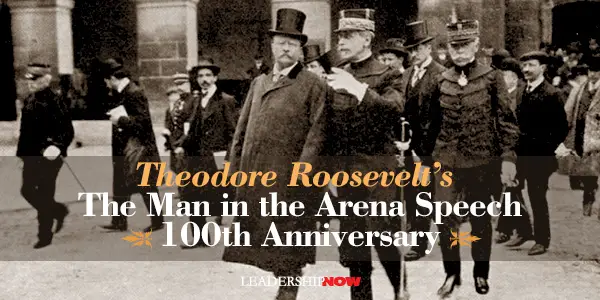  The speech emphasized his belief that the success of a republic rested not on the brilliance of its citizens but on disciplined work and character; the quality of its people. He told the audience: “Self-restraint, self-mastery, common sense, the power of accepting individual responsibility and yet of acting in conjunction with others, courage and resolution—these are the qualities which mark a masterful people.” And importantly, a democracy needed leaders of the highest caliber in order to hold the average citizen to a high standard. They were to do this not by words alone but by their deeds as well. “Indeed, it is a sign of marked political weakness in any commonwealth if the people tend to be carried away by mere oratory if they tend to value words in and for themselves, as divorced from the deeds for which they are supposed to stand.” Roosevelt firmly believed that one learned by doing. It is better to stumble than to do nothing or to sit by and criticize those that are “in the arena” he explained. “The poorest way to face life is with a sneer.” It is a sign of weakness. “To judge a man merely by success,” he said, “is an abhorrent wrong.” The famous paragraph from that speech, reproduced below, expressed the standard by which he judged himself and others: It is not the critic who counts; not the man who points out how the strong man stumbles, or where the doer of deeds could have done them better. The credit belongs to the man who is actually in the arena, whose face is marred by dust and sweat and blood; who strives valiantly; who errs, and comes short again and again, because there is no effort without error and shortcoming; but who does actually strive to do the deeds; who knows the great enthusiasms, the great devotions; who spends himself in a worthy cause; who at the best knows in the end the triumph of high achievement, and who at the worst, if he fails, at least fails while daring greatly, so that his place shall never be with those cold and timid souls who know neither victory nor defeat. Read the complete text of that speech: Citizenship in a Republic by Theodore Roosevelt Trivia: Theodore Roosevelt was the first President to fly an airplane, to own a car, to have a telephone in his home and travel outside the borders of the U.S. while still in office.
Posted by Michael McKinney at 12:39 AM
04.21.10

Mark Twain on Leadership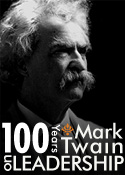 It could be said that he believed in Management By Wandering Around. In his autobiography he wrote, "In religion and politics people's beliefs and convictions are in almost every case gotten at second-hand, and without examination, from authorities who have not themselves examined the questions at issue but have taken them at second-hand from other non-examiners, whose opinions about them were not worth a brass farthing." Firsthand knowledge is a competitive advantage.
Posted by Michael McKinney at 07:07 AM

Twain on Self-Improvement: The Progress of a Moral PurposeTwain created a series of photographs that humorously point out what often goes through the minds of man when considering any kind of self-improvement. How often have we toyed with the idea only to conclude as Twain did, “Why bother? I’m good enough as I am.” See the series here.
Posted by Michael McKinney at 07:03 AM
04.19.10

5 Leadership Lessons: How to Lead a Fierce Competitor Company
Posted by Michael McKinney at 03:50 PM
04.17.10

Free E-books on Communication and Pricing This weekend you might want to read a couple of good e-books. And they're free! 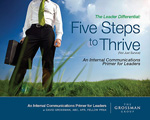 First, there is The Leader Differential: Five Steps to Thrive (Not Just Survive) by David Grossman, founder of The Grossman Group, a Chicago-based internal communications agency. This 21 page e-book is essentially an internal communications primer that offers corporate leaders basic (but effective) tips for communicating with employees in a way that will result in measurable outward company growth. Here are a couple of thoughts from this e-book: Reflect on what others are seeing and reading every time they interact with you, and develop the awareness not only to act the role of the leader you want to be, but to role model the actions and characteristics that you would like to see in others.And one of the biggest complaints employees have in these uncertain times is that they are not getting enough information or they get what turns out to be simply misinformation cloaked in openness. How much information is enough information? Grossman states: Naturally, it depends on the situation, but in the case, for example, that you’ve got a big elephant in the room—a reorganization, a high-level executive change, a merger or acquisition, a round of layoffs, or anything else that could be seen by employees as directly threatening their positions at your company—tell them what you know, what you don’t know, when you’re going to find out additional information, and stamp out myths or misperceptions. The key here is transparency, which means addressing the issue at hand before it spirals out of control.Grossman provides guidance in how much to communicate and then how to control the message. 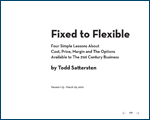 Next, check out Todd Sattersten’s Fixed to Flexible. This 37 page e-book is about cost, price, margin, and the options we have for how to sell. From the introduction: Fixed has been replaced with flexible. Control of a product category, distribution channel or branding message no longer exists. While this is being heralded as a boon for customers, companies have been slower to adapt to the new terrain. Companies with multi-national presence and individuals with multitudes of projects both need to create a new set of strategies.This ebook collects the commercial aspects of cost, price, and margin and presents a variety of alternatives about how to make your way in the world of infinite choice.
Posted by Michael McKinney at 08:01 AM
04.16.10

Does Your Leadership Have “White Space?”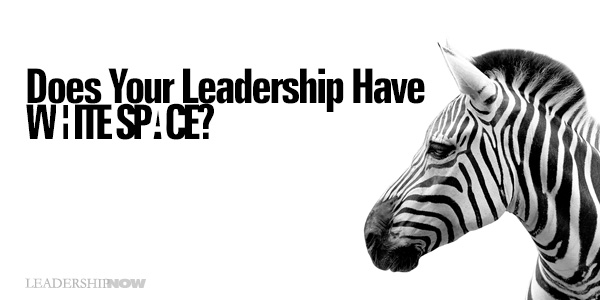
IIN THE VISUAL ARTS, white space is that area that is left blank or perhaps more accurately, open. It should not be thought of as unused space because it is actually an important part of the design itself. It is an “active” void. It adds to or enhances what the artist is trying to communicate. It clears away the clutter and allows the message to be heard.
Wendy Richmond is a visual artist, author, educator and a contributor to Communication Arts. In a recent column she discusses the need for white space in teaching art. She provides a wonderful example of the value of white space as applied in teaching and leadership: In my teaching, I use the idea of white space as a metaphor. When I develop a syllabus, I also design the activities for which I will not be present. On the first day of class, I tell my students, “By the end of this course, I hope to be the least important person in this room.” I believe that in addition to providing the content, my role is to create an environment that contains an active void. I need to disappear enough for my students to jump in and fill the learning environment with their own excitement and discovery. Again, as in my artwork, it takes confidence to leave that space empty. Creating white space in your leadership requires balance. Leadership is an art. White space doesn’t reflect a lack of leadership or structure as it might seem. On the contrary, strong leadership is what makes it possible. A leader has to shape that space in an ongoing way to ensure that they are allowing room for people to develop themselves, contribute and lead. The question is: do you as a leader have the confidence to do that?
Posted by Michael McKinney at 08:08 AM
04.14.10

The Little BIG Things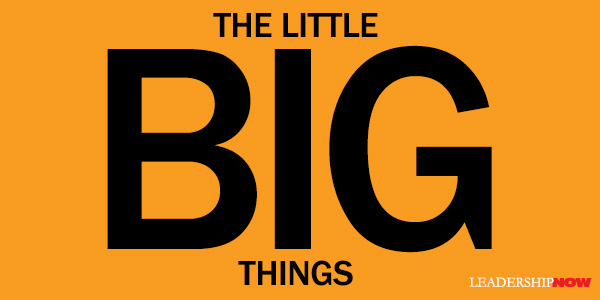
IN many ways leadership is about taking an oath of excellence. To a leader, excellence matters. Excellence requires “re-imagining” (to borrow a Peters’ term) your world done excellent. Leaders see things differently and this difference can be taught. Teaching excellence—one behavior at a time—is what The Little Big Things by Tom Peters, is all about. Some of what you will read in TLBT has been presented on the Tom Peters blog over the years. But for this book, the posts have been edited, revised, organized and conveniently packaged. It’s a compilation of 163 behaviors you can put into practice to achieve excellence in any endeavor. As such, it is not meant to be read straight through. Jump in anywhere it looks interesting. The process here is: read—consider—implement—repeat. Tom, as we’ve said here before, is good at boiling things down to basics. You’ll find opportunities to pursue excellence in basic insights that produce big results. Courtesies of a small and trivial character are the ones which strike deepest in the grateful and appreciating heart. Sometimes the little-big-things can seem too “soft” or beneath the demands of business. Tom explains: “Ideas like conscientiously showing appreciation are matchless signs of humanity—and the practice thereof, in my opinion, doubtless makes you a better person, a person behaving decently in a hurried and harried world….Acts of appreciation, to stick with my theme of the moment, are masterful, even peerless, ways of enthusing staff and partner and client alike, and, hence, greasing the way to rapid implementation of damn near anything. That is, ‘Soft is hard’ is wholly pragmatic—and more often than not, effectively implemented, makes the bottom line blossom!” Excellence has to be challenged into existence. The Little Big Things does just that. 
Posted by Michael McKinney at 08:00 AM
04.13.10

Leading Views: Teaching Fire a Lesson In Linchpin, Seth Godin explains the futility in trying to get others to conform to what we think they should be doing. It’s a form of control which stems from a lack of respect for others. People are going to do what they are going to do and for what seems to them to be very good reasons. Worrying about what other people are doing only clouds our judgment and upsets us emotionally and has little if any effect on them. Accepting people for what they are frees us to be the best we can be. Here’s Godin on teaching people a lesson: In Linchpin, Seth Godin explains the futility in trying to get others to conform to what we think they should be doing. It’s a form of control which stems from a lack of respect for others. People are going to do what they are going to do and for what seems to them to be very good reasons. Worrying about what other people are doing only clouds our judgment and upsets us emotionally and has little if any effect on them. Accepting people for what they are frees us to be the best we can be. Here’s Godin on teaching people a lesson:
Fire is hot. That’s what it does. If you get burned by fire, you can be annoyed at yourself, but being angry at the fire doesn’t do you much good. And trying to teach the fire a lesson so it won’t be hot next time is certainly not time well spent. Our inclination is to give fire a pass, because it’s not human. But human beings are similar, in that they’re not going to change anytime soon either. Many (most?) people in organizations handle their interactions as though they are in charge of teaching people a lesson. We make policies and are vindictive and focus on the past because we worry that if we don’t, someone will get away with it. So when a driver cuts us off, we scream and yell. We say we’re doing it so he’ll learn and not in danger the next guy, but of course, he can’t hear you. There’s a media mogul who stole from me in 1987 and I haven’t spoken to him since. He doesn’t know I exist, I bet. So much for teaching him a lesson. The ability to see the world as it is begins with an understanding that perhaps it’s not your job to change what can’t be changed. Particularly if the act of working on that change harms you and your goals in the process.
Posted by Michael McKinney at 06:28 AM
04.12.10

What’s Killing Your Mojo?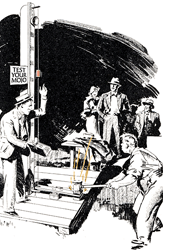 Mojo is that positive spirit toward what we are doing now that starts from the inside and radiates to the outside, writes Marshall Goldsmith. It’s that sense others get about us that comes from the harmony between what we feel about what we are doing and what we show on the outside. It’s about two simple goals: loving what you do and showing it. Mojo is that positive spirit toward what we are doing now that starts from the inside and radiates to the outside, writes Marshall Goldsmith. It’s that sense others get about us that comes from the harmony between what we feel about what we are doing and what we show on the outside. It’s about two simple goals: loving what you do and showing it.
The kind of positive impression you make profoundly affects your ability to influence. Mojo can make or break your leadership effectiveness. The greater your Mojo, the more times you’ll ring the bell. Goldsmith says that four ingredients need to be combined in order for you to have great Mojo: Identity: Who you think you are? Or how do you perceive yourself? Our identity is created in a number of ways: remembered (life experience), reflected (what others think of us), programmed (what others think we should be) and created (what we consciously choose to be). “To change your Mojo, you may need to either create a new identity for yourself or rediscover an identity that you have lost.” Achievement: What have you done lately? There is a difference between what we think we achieve and what others think we achieve. When these get out of sync we can have a Mojo crisis. Understand what "achievement" means to you. “Try not to go through life deluding yourself by pretending that when the world cares, you do—or pretending that when the world does not care, you do not care.” Reputation: What do other people think you are? Your reputation is a scoreboard kept by others. You can’t control it, but if it’s killing your Mojo, there's a lot you can do to improve it. You can choose the reputation you want if you are disciplined enough to live out your objectives in daily, consistent behaviors. Acceptance: What can you change, and what is beyond your control? Acceptance means you dispense with what Goldsmith calls the Great Western Disease—the “I’ll be happy when…” statement. You know how it goes: “I will be happy when I have a million dollars in the bank, when my house is bigger, or when I look the way I want.” There’s nothing wrong with wanting those things but we often fixate on the future at the expense of enjoying the life we’re living now. Worse still we whine, complain and lay blame for things that happen to us instead of taking it all in stride. “By carrying around anger and negative baggage, we weigh ourselves down. We limit our opportunities to find meaning and happiness. We kill our Mojo.” We kill our Mojo by committing mistakes like these: Over-committing. When you're bursting with Mojo, everybody wants you be a part of what your doing. This can lead to over-commitment. It is “one of the sweet but risky blowbacks from having Mojo." Understandably we don’t want to look weak, naturally we loved to be included, or perhaps we think we’re superhuman, but whatever the case it can kill our Mojo. Waiting For the Facts to Change. This is wishful thinking. It is a common response to a setback. It’s the opposite of over-committing because while you’re waiting for a more comfortable set of facts to appear, you do nothing. Goldsmith helpfully advises: “When the facts are not to your liking, ask yourself, ‘What path would I take if I knew that the situation would not get better?’ Then get ready to do that.” Looking For Logic in All the Wrong Places. Humans are not always logical, yet we persist in trying to find logic where no logic exists or try to prove others wrong with our superior logic. Again Goldsmith nails it: “The next time you pride yourself on your superior ‘logic’ and damage relationships with people you need at work—or the people you love at home—ask yourself, ‘How logical was that?’” Bashing the Boss. This should speak for itself. See acceptance. Refusing to Change Because of “Sunk Costs.” “We persist in error,” says Goldsmith, “because we cannot admit error.” If your decisions are based on what you have to lose instead of what you have to gain, your “sunk costs” may be costing you more than you know. Confusing the Mode You’re In. There is our professional mode and our relaxed mode. And we shift between the two without even thinking about it. “The executives you most admire tend to be those who, with constant discipline, never drift out of professional mode….They have chosen a role for themselves, and they rarely go off script. They are professionals. That’s why they have Mojo.” In the final chapters of the book, you will find 14 tools to help you build, rebuild or redefine your Mojo. Goldsmith pours his understanding of people and situations, gained from years of experience, into this book. Acting on his wisdom will save you the unnecessary detours so common to the human condition. Of Related Interest:
Posted by Michael McKinney at 07:59 AM
04.07.10

Goldsmith’s Rule of Hierarchical PerspectiveMarshall Goldsmith presents in Mojo, a perspective that if taken to heart could free many people from the frustration they encounter when they find someone over them in a hierarchy. Sometimes we are the smartest, quickest, best person in the room and we can’t understand why we aren’t in the driver’s seat. And we let everyone know it. We get resentful and disrespectful and unwittingly erode any influence we might have had—compounding our own problem.Whenever we begin to moan about something not going our way, we might remember Goldsmith’s prescription: Every decision in the world is made by the person who has the power to make that decision—not the “right” person, or the “smartest” person, or the “most qualified” person, and in most cases not you. If you influence this decision maker, you will make a positive difference. If you do not influence this person, you will not make a positive difference. Make peace with this. You will have a better life! And, you will make more of a positive difference in your organization and you will be happier.
Posted by Michael McKinney at 11:41 PM
04.01.10

First Look: Leadership Books for April 2010Here's a look at some of the best leadership books to be released in April.




For bulk orders call 1-800-423-8273 Someone once wrote, “A person who has not disciplined themselves to read has narrowed their freedom to choose between ideas. They are confined to what they hear. They are at the mercy of the propagandist. They have limited their freedom to think.”  Build your leadership library with these specials on over 160 titles. All titles are at least 40% off the list price and are available only in limited quantities.
Posted by Michael McKinney at 12:02 AM
|
BUILD YOUR KNOWLEDGE


How to Do Your Start-Up Right STRAIGHT TALK FOR START-UPS 
Grow Your Leadership Skills NEW AND UPCOMING LEADERSHIP BOOKS 
Leadership Minute BITE-SIZE CONCEPTS YOU CAN CHEW ON 
Classic Leadership Books BOOKS TO READ BEFORE YOU LEAD |
|